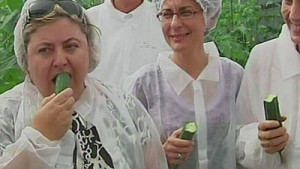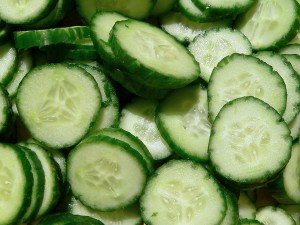One in a hundred cucumbers carries Salmonella, according to new data from the U.S. Food and Drug Administration — and for fresh hot peppers that number rises to three per hundred.
 Both the vegetables were targeted by the agency’s proactive testing because of their role in previous outbreaks. Because cucumbers are often eaten raw, bacteria on them are more likely to make it into food; raw cucumbers have been blamed in five outbreaks of illness from 1996 to 2014.
Both the vegetables were targeted by the agency’s proactive testing because of their role in previous outbreaks. Because cucumbers are often eaten raw, bacteria on them are more likely to make it into food; raw cucumbers have been blamed in five outbreaks of illness from 1996 to 2014.
Hot peppers, such as jalapeño and serrano peppers, on the other hand, are often cooked but can be a “stealth component” of multi-ingredient dishes, the FDA said. In 2008, hot peppers were implicated in an outbreak that caused 1,500 illnesses, 308 hospitalizations, and two deaths.
The FDA’s proactive sampling program began testing for disease-causing microbes in certain foods in 2014 to learn more about the prevalence of disease-causing bacteria and to help the agency identify patterns that may help predict and prevent future contamination.
The latest findings, released lastThursday, included results from 1,050 cucumber samples and 1,130 hot pepper samples. Eventually 1,600 of each will be sampled.
Of the cucumber samples, 15 tested positive for salmonella. None tested positive for E. coli. Of the hot pepper samples, 35 tested positive for salmonella, and one tested positive for a strain of Shiga toxin-producing E. coli that was determined to be incapable of causing severe illness.
The samples were collected at ports, packing houses, manufacturers, and distributors across the US.
The agency may take enforcement action, such as a recall, on foods that test positive.
“This testing is still underway and no conclusions can be drawn at this time,” according to the FDA.
In 2014, the FDA started a sampling program for a variety of commodities to learn more about the prevalence of disease-causing bacteria on the commodities.
The microbiological sampling assignments were designed to collect a statistically determined number of samples of certain commodities over 12 to 18 months and test them for certain types of bacteria that can cause foodborne illnesses.



